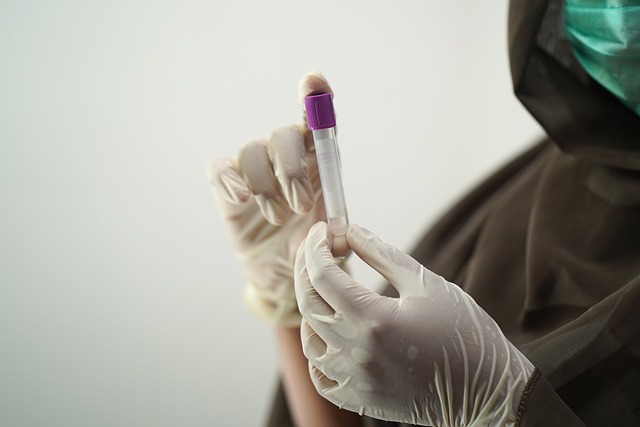A cholesterol blood test in the UK is a fundamental step for managing cardiovascular health. This test provides a detailed lipid profile by measuring high-density lipoprotein (HDL), known as 'good' cholesterol, and low-density lipoprotein (LDL), termed 'bad' cholesterol, along with triglycerides. HDL plays a significant role in maintaining heart health by removing excess cholesterol from the bloodstream and aiding its breakdown by the liver. Elevated LDL levels can lead to plaque buildup in arteries, increasing the risk of heart attacks or strokes. Triglycerides contribute to energy storage but high levels can raise the risk for coronary artery disease. Regular cholesterol testing via the NHS is recommended for individuals over 40 and those at higher cardiovascular risk. The test results are crucial for personalized preventative healthcare, guiding lifestyle adjustments and medical treatment when necessary. In the UK, managing cholesterol levels through diet, exercise, and appropriate interventions as advised by healthcare providers is key to reducing the risk of heart disease and stroke. The Cholesterol Blood Test UK serves as a vital diagnostic tool in this process, offering clear insights for individuals to take charge of their cardiovascular health.
Maintaining optimal health involves a multifaceted approach, one critical component of which is monitoring cholesterol levels. The Cholesterol Blood Test UK plays an indispensable role in this health maintenance strategy, providing individuals with insights into their lipid profiles and cardiovascular risk factors. This article delves into the significance of these tests, outlines the process one can expect when undergoing cholesterol blood testing in the UK, and offers guidance on interpreting test results within the UK’s health context. Understanding cholesterol is key to proactive health management and can be a crucial step in preventing heart disease and stroke.
- Understanding Cholesterol: The Role of Lipid Profiles in Health Assessment
- The Process of Cholesterol Blood Testing in the UK: What to Expect
- Interpreting Your Results: Guidelines for Cholesterol Levels and Management in the UK Context
Understanding Cholesterol: The Role of Lipid Profiles in Health Assessment

Understanding cholesterol is a fundamental aspect of maintaining cardiovascular health, and it begins with a comprehensive lipid profile through a cholesterol blood test in the UK. This test measures the levels of different types of cholesterol—high-density lipoprotein (HDL), low-density lipoprotein (LDL), and triglycerides—in the bloodstream. HDL, often hailed as ‘good’ cholesterol, helps to remove other forms of cholesterol from your arteries and transport them back to the liver for breakdown. Conversely, LDL cholesterol, known as ‘bad’ cholesterol, can build up in your artery walls, leading to plaque, which over time can restrict blood flow and potentially cause heart attacks or strokes. Triglycerides are another form of fat that the body uses for energy; high levels can increase the risk of coronary artery disease. In the UK, cholesterol blood tests are routinely used in health assessments to gauge an individual’s risk for cardiovascular diseases and to inform treatment decisions. These tests are readily available through the NHS or private healthcare services across the country, making it convenient for individuals to monitor their lipid levels and take proactive steps towards heart health. Regular monitoring, combined with a healthy lifestyle and medical interventions when necessary, can significantly reduce the risk of cardiovascular events.
The Process of Cholesterol Blood Testing in the UK: What to Expect

When undergoing a cholesterol blood test in the UK, individuals can expect a straightforward and efficient process designed to assess their lipid profile effectively. The test, known as a lipid panel or cholesterol profile, measures four key components: total cholesterol, low-density lipoprotein (LDL) cholesterol, high-density lipoprotein (HDL) cholesterol, and triglycerides. To begin the process, a healthcare professional will typically take a blood sample from a vein in your arm, often in the inside of the elbow, using a sterile needle. This procedure is commonly performed in GP surgeries, community clinics, or hospital laboratories across the UK. The procedure itself is brief and relatively painless; you’ll feel a slight prick and then the withdrawal of blood. Once the sample is collected, it is sent to a laboratory for analysis. The results from a cholesterol blood test UK can indicate your risk for cardiovascular diseases by providing insights into your cholesterol levels, which are critical for maintaining heart health. It’s recommended that individuals over 40 or those at higher risk of cardiovascular disease consider regular testing as part of their preventative healthcare routine. The results will guide any necessary lifestyle changes or medical interventions to manage and lower cholesterol levels if needed.
Interpreting Your Results: Guidelines for Cholesterol Levels and Management in the UK Context

Understanding your cholesterol levels through a blood test in the UK is a critical step in managing your cardiovascular health. The National Health Service (NHS) guidelines recommend regular cholesterol checks for individuals over the age of 40, as well as those at higher risk of heart disease or stroke. Cholesterol levels are typically reported in millimoles per litre (mmol/L), with total cholesterol considered a key indicator of heart disease risk. In the UK, the target for total cholesterol is less than 5 mmol/L, with lower-than-optimal levels indicating a need for lifestyle changes or medication to manage cholesterol. The test specifically measures the amount of cholesterol carried in the blood, which includes both LDL (low-density lipoprotein) and HDL (high-density lipoprotein) cholesterol. LDL is often referred to as ‘bad’ cholesterol because high levels can lead to plaque buildup in arteries, increasing the risk of heart attack or stroke. Conversely, HDL is known as ‘good’ cholesterol as it helps remove other forms from your bloodstream. The NHS provides comprehensive guidelines on managing cholesterol levels through diet, exercise, and, if necessary, medication. These management strategies are tailored to individual risk factors and health status, making the UK’s approach to cholesterol management both personalized and effective. For those who receive a high cholesterol reading, it is important to consult with healthcare professionals for personalized advice and to discuss potential treatment options, including statins, which have been shown to significantly reduce the risk of heart attacks and strokes in individuals with high cholesterol levels. The Cholesterol Blood Test UK is an essential diagnostic tool that, when interpreted within the context of these guidelines, can empower individuals to take charge of their cardiovascular health.
Regular cholesterol level testing via blood tests is a pivotal aspect of maintaining cardiovascular health in the UK. Comprehending the role of lipid profiles through the detailed examination ‘Understanding Cholesterol: The Role of Lipid Profiles in Health Assessment’ is crucial for individuals and healthcare providers alike. The process laid out in ‘The Process of Cholesterol Blood Testing in the UK: What to Expect’ ensures a standardised approach to screening, making it accessible and understandable for all. Finally, interpreting cholesterol levels as outlined in ‘Interpreting Your Results: Guidelines for Cholesterol Levels and Management in the UK Context’ provides clear directives on managing one’s cholesterol, thereby supporting informed health decisions nationwide. Incorporating these tests into routine health check-ups can significantly contribute to early detection and prevention of cardiovascular diseases, highlighting the importance of the Cholesterol Blood Test UK in safeguarding public health.
